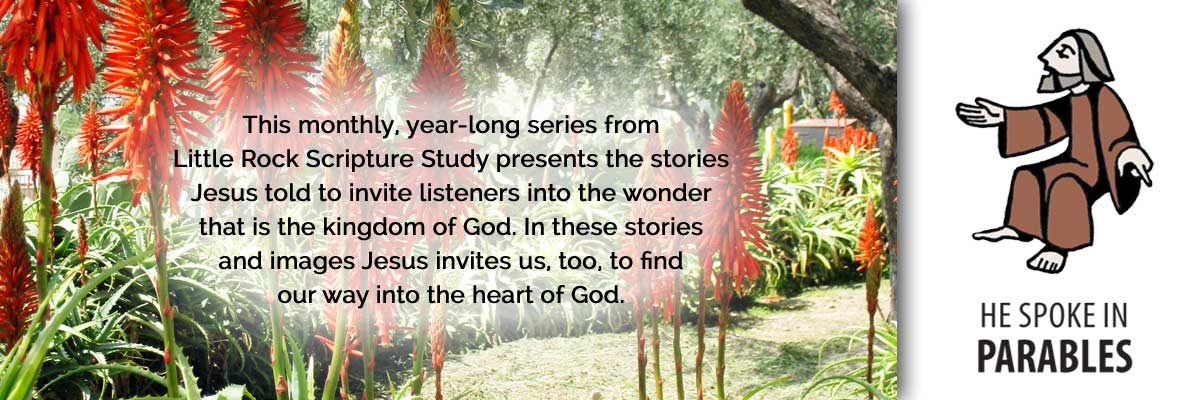Official Website of the
Catholic Diocese of Little Rock
Generosity is key to prodigal son parable
Published: June 22, 2015
This is the sixth column in a 12-part series.
By Cackie Upchurch
Director of Little Rock Scripture Study
“What’s in a name?” said Juliet to Romeo, assuring him that names are mere artificial conventions, that indeed a Capulet can love a Montague. Indeed, names and titles, while often helpful, may focus our attention on only one aspect of reality and not the whole of it nor the most important aspect of it.

Take, for example, the story most often referred to by biblical editors as “the parable of the prodigal son” or “the parable of the lost son.” We know the basic story line (Luke 15:11-32). A man has two sons, one of which is dedicated and hardworking, the other more concerned with personal fulfillment than family obligation. The latter callously asks for his share of a future inheritance, spends it all carelessly, and then, in shame, returns to his father’s home and is welcomed back with a feast befitting a king.
The older, more faithful brother is usually remembered as a miserly party pooper whose jealously threatens to ruin the celebration. The father invites his older son to enter into rejoicing and to acknowledge that finding the lost is worthy of celebration.
If we focus on the prodigal son as the common title tends to do, we miss so many opportunities to be awed and surprised and transformed. The central focus of this parable is not the lost son, or even the steadfast son, but actually the father who is exorbitant in his generosity. In fact, when we focus our attentions primarily on the sons, we take this as a simple story of reversal of fortunes. Or, we tend to fall into a commonly accepted belief that if there is a winner (in this case, the younger, wasteful son), there must be a loser (in this case, the older, grumpy son).
This story might be better named, or at least alternately pondered, as “the parable of the loving father” or “the parable of a lavishly generous father.” That might call us to enter the story with a different set of expectations. We might then notice that upon return, the son confesses his sin (15:18, 21) but the father responds not with the language of forgiveness or repentance but with an embrace that restores the relationship. He speaks of being dead and now alive, of being lost and now found (15:24, 32).
If we focus mainly on the father, we might see that he forsakes the dignity that would have been expected of him. In two instances, he breaks with custom and seeks out his sons, sons whose behavior would normally have been shameful in that culture. He runs to meet the returning son rather than waiting inside for an apology. He also leaves the celebration to listen to his older son’s complaint and plead with him to join in the festivities.
If we continue to focus on the father, we have to let go of our preconceived ideas about penance. We may have grown accustomed to the traditional signs of penance in the Bible and our religious tradition, the mention of sackcloth and ashes, rending one’s garments and giving alms as a sign of restoration. It’s shocking to see none of these elements in the father’s response. Instead we find a fatted calf and new clothing and jewelry, music and dancing. It’s almost an affront to common sense to find such merriment after such shameful behavior.
Perhaps, then, there are at least two characters in this story who are prodigal, and another who is invited to be. The Merriam-Webster dictionary defines “prodigal” as “characterized by profuse or wasteful expenditure.” Many of us grew up thinking that being prodigal applied only to the son who wasted his inheritance.
But the most prodigal figure in the story is the father, who was willing to “waste” his dignity, willing to spend his love in celebration, willing to profusely celebrate the return of a son he loved. It was unreasonable by most standards, and yet the older son is likewise invited to “waste” some love in celebrating the brother who was lost but now found.
Jesus’ parable speaks eloquently and shockingly of the lavish and generous love of God. Never did the father in the parable choose one son over the other. God’s love is likewise inclusive, inviting us to put aside jealousy when grace is given without measure to someone who does not seem to deserve it, even when that someone is us.
Study Questions
- This parable is found in the Gospel of Luke in a section filled with other parables of Jesus. (Glance through Luke 13:6 – 16:31 to review even the titles assigned to the stories Jesus told.) When have you heard one of Jesus’ parables and it helped you to think differently?
- Having read the story of Luke 15:11-32 and the article above, what name would you give it?
- In what ways have you recently experienced the prodigal nature of God’s love and forgiveness?
- In what life situations are you being challenged to imitate the lavish generosity of God in your relationships?
This article was originally published in Arkansas Catholic June 20, 2015. Copyright Diocese of Little Rock. All rights reserved. This article may be copied or redistributed with acknowledgement and permission of the publisher.




